In this article:
Constipation is a common complaint in about 15% of the general population. It is defined as the infrequent and difficult passage of stool. It affects the female population more than males and is common in older individuals over the age of 65 years and in very young children.
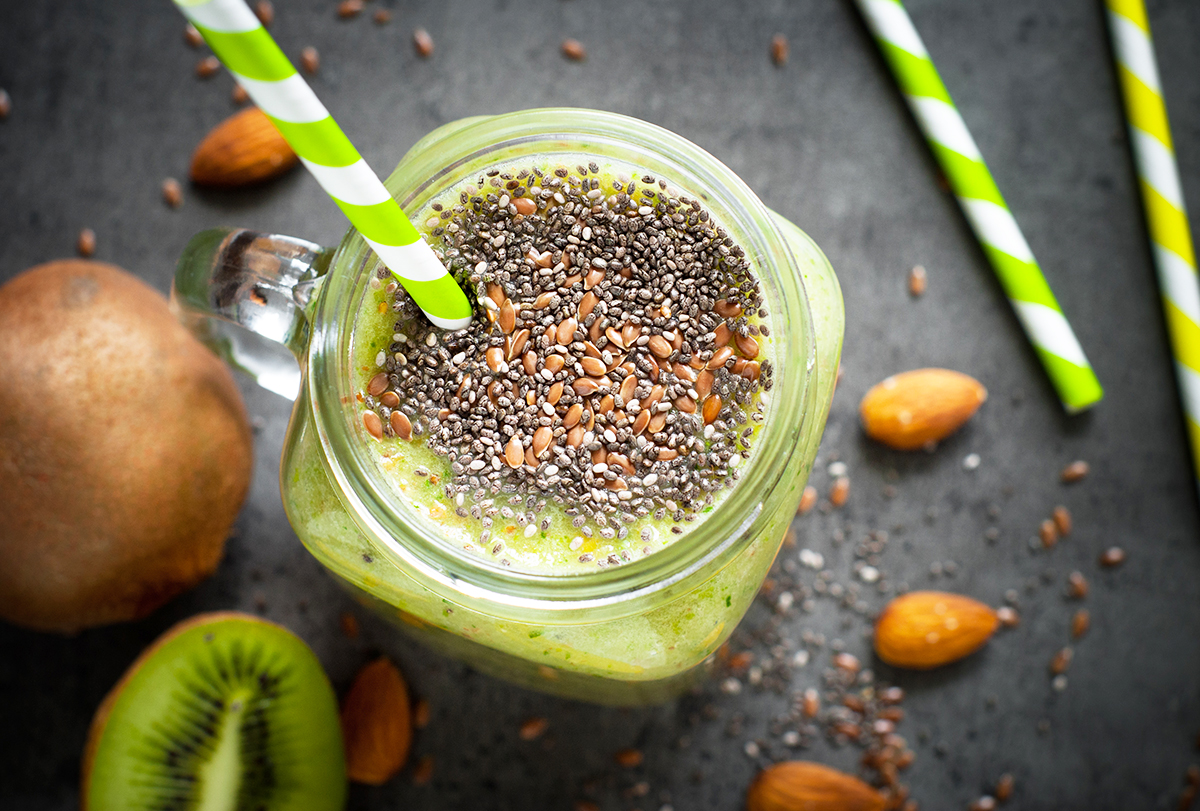
Symptoms of constipation can include bloating, abdominal pain or discomfort, and straining while passing stool or hard stools. (1)
Constipation can be due to several reasons:
- Chronic illnesses that affect the metabolism such as diabetes, hypothyroidism, and hypercalcemia (excessive calcium in the body)
- Medications such as nonsteroidal anti-inflammatory agents, antidepressants, medications for high blood pressure that work by blocking calcium channels, and some supplements such as those for iron
- Neurological disorders such as Parkinson’s disease, multiple sclerosis, and dementia
- Structural disorders such as colon cancer and strictures (1)
Most constipation is treated relatively easily at home by using medications and natural remedies that act as laxatives and increasing dietary fiber intake. If constipation persists, more therapeutic approaches are taken. (1)
Laxatives are substances that add fiber and bulk to the stool and ease its passage along the bowel. Foods that have high water and fiber content are considered for the management of constipation.
Read on to know about natural foods that also act as laxatives.
Foods That Act as Laxatives
Include these foods in your diet to prevent constipation.
1. Prunes
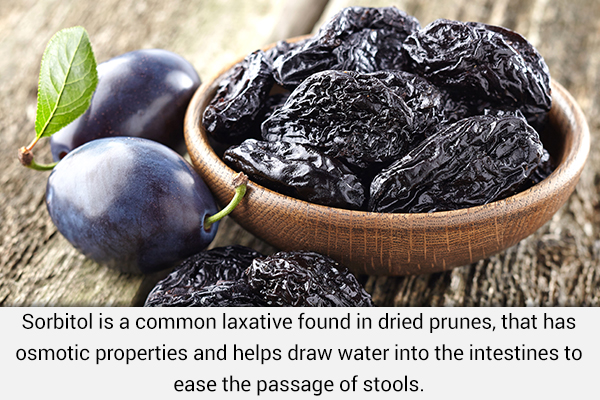
Prunes are the dried plums of a plant Prunus domestica L. The fruit is dried in hot air and is processed to produce prune juice, prune jam, and other products.
Dried prunes contain 6.1 g of dietary fiber for every 100 g. It has a high sorbitol content of 14.7 g/100 g. (2) Sorbitol is a common laxative that has osmotic properties and helps draw water into the intestines to ease the passage of stools. (3)
Prunes also contain a large amount of phenolic compounds that also contribute to their laxative action and delay glucose absorption.
In a 2019 study on healthy individuals with low fiber intake and infrequent stool habits, consuming 80–120 g of prunes per day increased their stool weight and frequency. (4)
How to consume:
Soak 9–10 prunes (100 g) in ½ cup of water overnight and consume it the next morning along with the water. The soaked prunes will be higher in water content, which will add to its laxative benefits and also provide hydration.
2. Kiwi
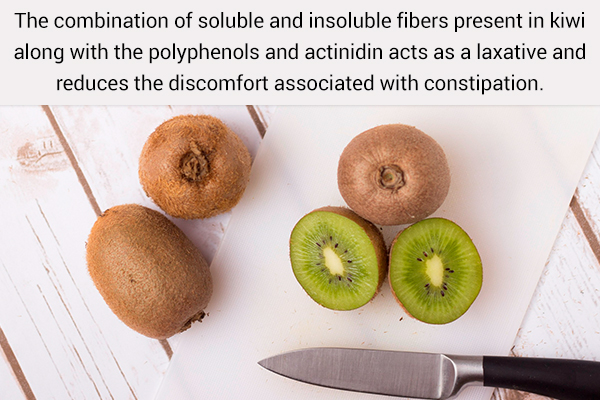
Whole kiwifruit has been promoted for its use in easing digestive symptoms and constipation. The combination of soluble and insoluble fibers present in kiwi along with the polyphenols and actinidin acts as a laxative and reduces the discomfort associated with constipation. (5)
In one human trial, consumption of three golden kiwi fruit resulted in improved stool frequency and softer stool, which reduced straining. Pain and indigestion were also improved with the consumption of kiwifruit. (6)
How to consume:
Eating three kiwis per day in the case of acute constipation will ease its symptoms. Once the condition improves, a kiwi fruit each day will be helpful in maintaining healthy bowel movements.
3. Figs
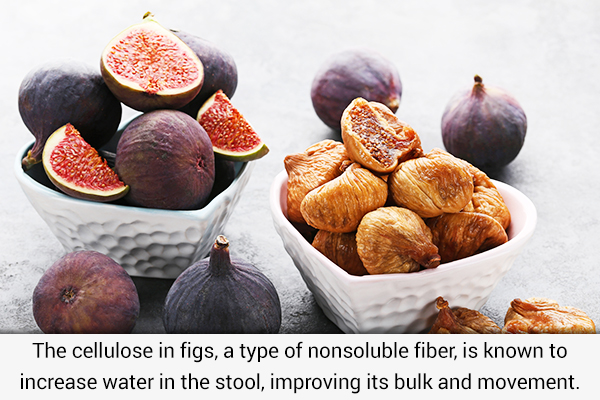
Figs are high in natural and simple sugars, minerals, water, and fiber. They also contain several flavonoids and polyphenols. The cellulose in figs, a type of nonsoluble fiber, is known to increase water in the stool, improving its bulk and movement. (7)
In an animal study, fig paste increased stool weight and improved movement in dogs. (7)
In another study, consumption of fig syrup for 4 weeks reduced abdominal pain and improved the frequency of stools in children aged 2–10 years. (8)
How to consume:
- Consuming up to two fresh figs a day or four dried figs soaked overnight in ½ cup of water can be beneficial.
- Dried figs can also be used in smoothies (ensure the pulp is consumed), and fresh figs can be added to salads.
4. Apples
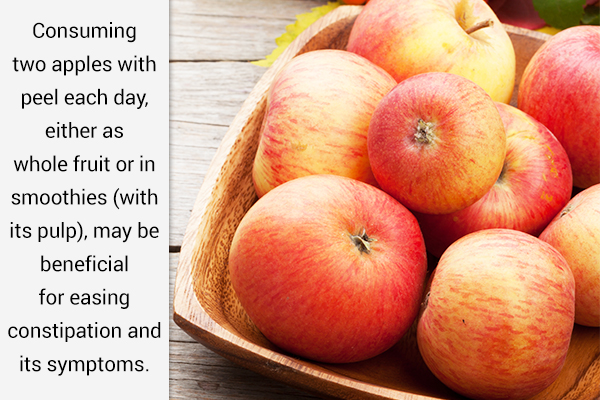
“An apple a day keeps the doctor away,” without doubt, due to its rich nutrient content. It is also easily available and widely consumed.
One apple contains 4.4 g of fiber, (9) which mainly comprises cellulose, hemicellulose, and pectin (a type of soluble fiber that becomes gel-like when mixed in water). It is also rich in polyphenols. (10)
In one study, patients with constipation who consumed 24 g of pectin each day for 4 weeks experienced improved frequency of stools through the increase in good bacteria in the gut along with improved other symptoms of constipation. (11)
How to consume:
Consuming two apples with peel each day, either as whole fruit or in smoothies (with its pulp), may be beneficial for easing constipation and its symptoms.
5. Okra
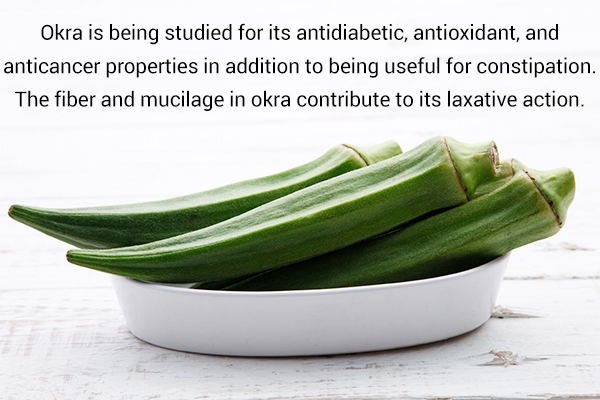
Okra, the thin finger-like slimy green vegetable, is popularly consumed worldwide. The slimy texture of cut okra is attributed to the presence of mucilage, which is rich in protein, carbohydrates, neutral sugars, and minerals.
Okra is being studied for its antidiabetic, antioxidant, and anticancer properties in addition to being useful for constipation. (12) The fiber and mucilage in okra contribute to its laxative action. (13)
How to consume:
- Since mucilage is water soluble, soaking 4–5 slit okra in a glass of water overnight helps dissolve the mucilage. The water can be consumed the next day.
- Okra can be consumed steamed or boiled as heat helps soften the fiber and release the mucilage.
6. Pears
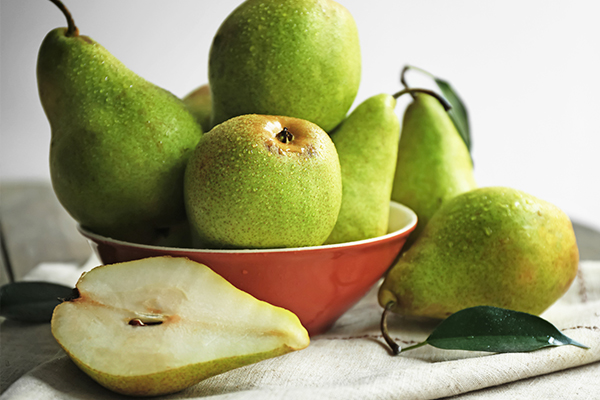
Pears are rich in fiber, with 4.6 g of fiber in one small fruit. (14) They are a rich source of sorbitol, which along with dietary fiber improves gut health and prevents constipation by acting as a laxative. (15)
How to consume:
Pears (with peel) can be had raw as a fruit, in salads, or in smoothies.
7. Sweet potato
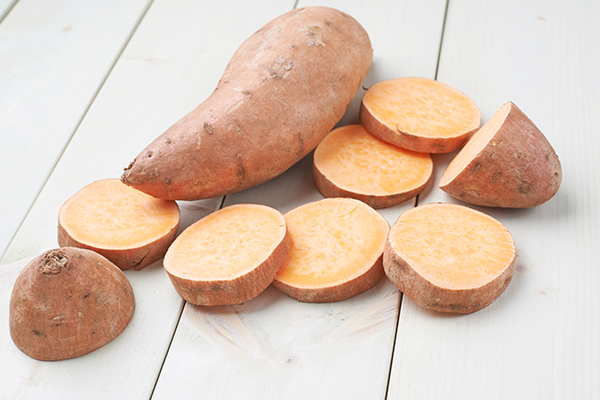
Sweet potato is rich in nutrients and fiber. One medium sweet potato contains 3.8 g of fiber. (16)
The dietary fiber of sweet potato is composed of cellulose, lignin, pectin, and hemicellulose. These fibers can hold water and add bulk to the stool. (17)
In a 2016 study that included patients with leukemia receiving chemotherapy, consumption of 200 g of sweet potato each day had a positive impact on preventing constipation and facilitated smooth bowel movement. (18)
8. Chia seeds
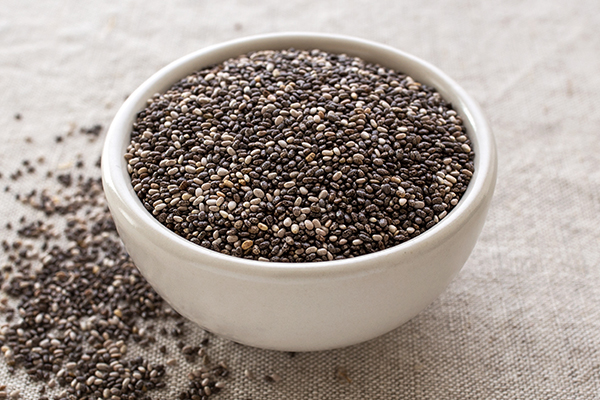
Just a single ounce of these tiny seeds contains 11 g of dietary fiber. (19)
Chia seeds have the unique characteristic of forming a gel upon soaking in water. The gel is comparable to the gelatin that is used in the food industry.
Chia seeds also have a good water holding capacity, (20) which adds bulk to the stool and helps in its easy passage along the intestines.
How to consume:
- Chia seeds can be used in puddings and smoothies.
- One tablespoon of chia seeds can be mixed with 500 ml of water and consumed throughout the day.
9. Flaxseeds
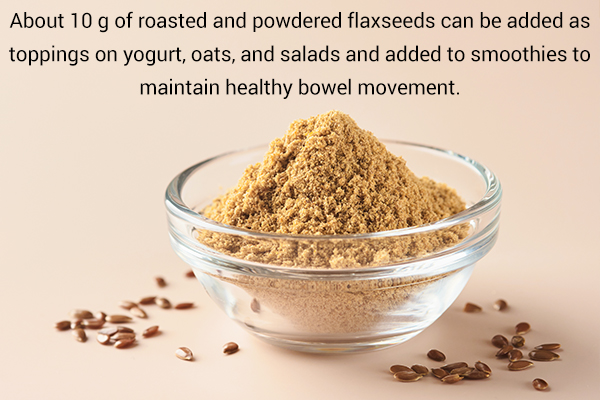
Flaxseeds are rich in polyunsaturated fatty acids, omega-3 fatty acids, soluble fiber, and lignin precursors.
In a study, consuming 10 g of flaxseed decreased constipation symptoms along with body weight and fat in the participants. (21)
More studies need to be undertaken to understand the effect of flaxseeds on constipation, though their fiber content is generally already beneficial.
How to consume:
About 10 g of roasted and powdered flaxseeds can be added as toppings on yogurt, oats, and salads and added to smoothies to maintain healthy bowel movement.
10. Castor oil
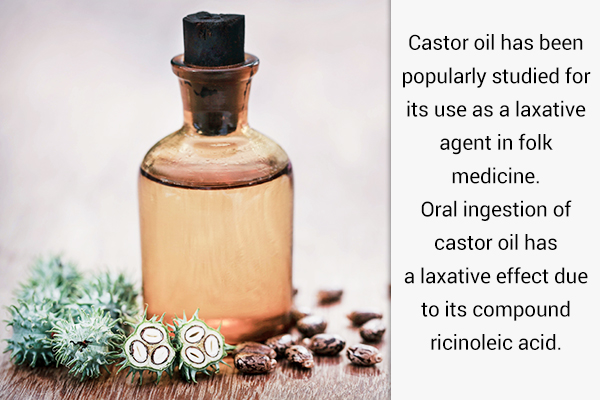
Castor oil has been popularly studied for its use as a laxative agent in folk medicine.
Oral ingestion of castor oil has a laxative effect due to its compound ricinoleic acid. (22) However, the mechanism by which it occurs needs to be studied.
In one study, consumption of castor oil in elderly suffering from constipation for more than 10 years eased their symptoms of constipation. (23)
How to consume:
- One tablespoon of castor oil can be ingested directly at bedtime.
- Castor oil can also be drizzled onto salads or dishes.
Precautions to Consider
Although the intake of foods that act as laxatives, especially fruits and vegetables, is highly beneficial, there are also several adverse effects you need to consider:
- Overconsumption of bulk-forming laxatives such as fruits can cause diarrhea, nausea, or bloating.
- Abuse of laxatives in people suffering from eating disorders is a common concern and should be monitored.
- Avoid juicing the fruits mentioned in this article. One of the main components that make these foods act as laxatives is fiber. Juicing oftentimes removes the beneficial fiber.
Most-Asked Questions About Laxatives
Can I use psyllium husk (isabgol) to treat my constipation?
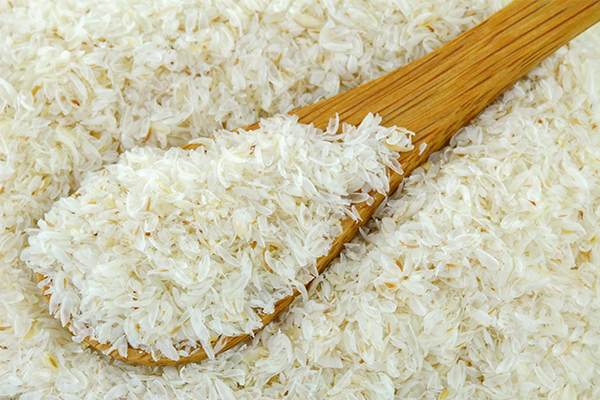
Psyllium husk can be a great way to ease constipation and discomfort. It’s a soluble fiber that adds bulk to the stool and holds water to allow easy passage of the stool.
However, as it adds no nutritional value and becomes bulky upon absorbing water, there is a risk that it may cause widening of the large intestine and loosening of the muscle. Therefore, it is advisable not to rely on it for long-term use.
Will natural laxatives hurt?
Consumption of natural laxatives is often safe and doesn’t hurt, but it is crucial not to overconsume them.
Can I consume laxatives to lose weight?
Using laxatives to achieve weight loss is not safe. Overconsumption can cause loss of nutrients and can lead to diarrhea.
Will I become reliant on or addicted to laxatives?
Natural foods are generally safe to consume. They are a part of the daily diet and will not cause any harm if consumed in recommended amounts. Once the acute constipation is resolved, the amounts of fiber-rich food can be reduced slightly.
Final Word
Constipation is one of the most common digestive problems in children and adults. Consuming dietary fiber and laxatives can be useful in easing its symptoms. Some natural foods have soluble fiber and compounds that add bulk to the stool and help reduce stool infrequency.
Although some research evidence is available on such foods, more trials need to be undertaken to replicate the results. If you choose to consume these foods for their laxative properties, it is vital to remember that overconsumption can lead to diarrhea, nausea, and bloating.
Moreover, it is ideal to include fiber-rich fruits and vegetables in your daily diet to maintain good gut health.
- Was this article helpful?
- YES, THANKS!NOT REALLY


